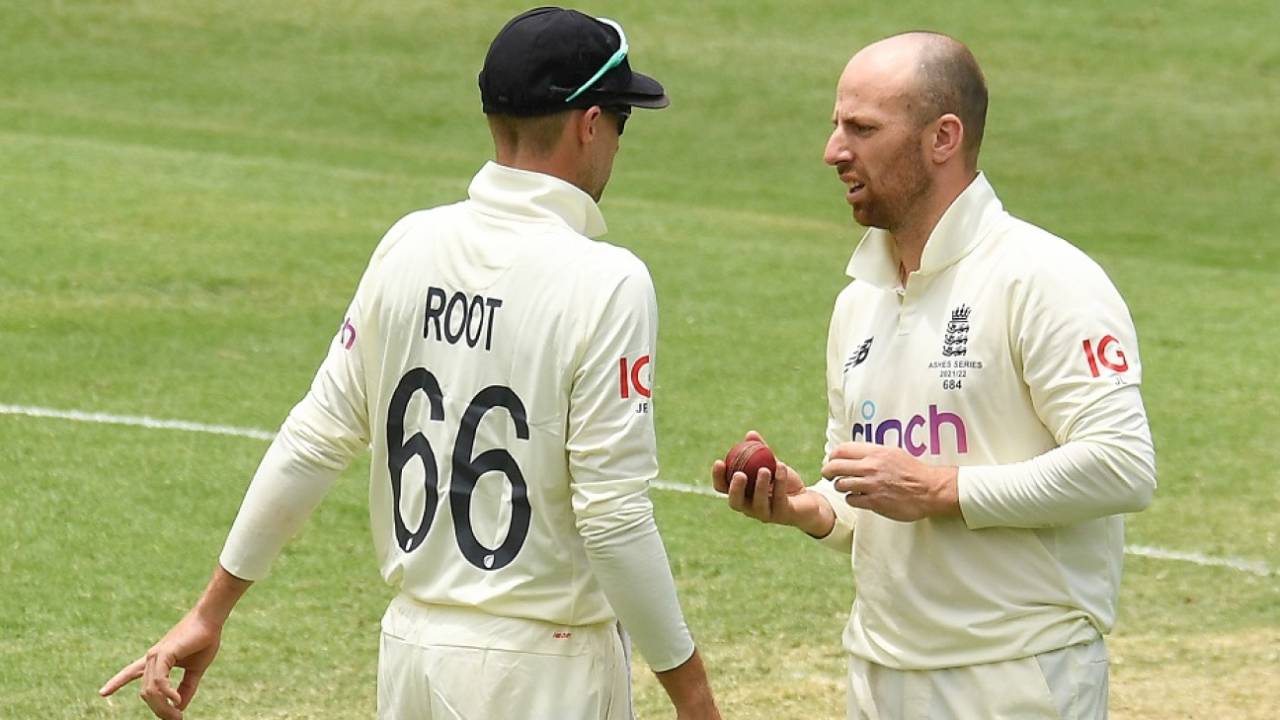Root faces 'tricky decisions' around bowling combination on 'thatchy' Adelaide pitch
Will Leach or Bess play? Who will go out to make room for Anderson and Broad?
Andrew McGlashan
Dec 14, 2021, 5:11 AM
Joe Root and Jack Leach discuss their plans in the middle • Getty Images
Joe Root has admitted that England are facing some "tricky decisions" over the make-up of their XI for the day-night Test in Adelaide, largely centred on the balance of the attack and the role spin might play.
The three quicks on display in Brisbane - Chris Woakes, Mark Wood and Ollie Robinson - were impressive during much of the second day before tiring under the onslaught by Travis Head. However, James Anderson and Stuart Broad are both expected to play in the pink-ball encounter having sat out at the Gabba, while there is the looming decision on the position of left-arm spinner Jack Leach after he went for 102 off 13 overs.
Four years ago, England had Moeen Ali to provide the spin - though he went wicketless through 29 overs - and played four specialist quicks, all of whom are part of this tour. Whether they feel able to include Leach or offspinner Dom Bess this time around may come down to Ben Stokes' bowling ability following his jarred knee at the Gabba.
Nathan Lyon has an impressive record in day-night Tests with 29 wickets at 27.41 (19 at 25.78 in Adelaide) and Head, who plays his domestic cricket for South Australia, expects spin to be a key element on a surface he called "thatchy". The forecast for Friday, the second day of the Test, is also for an expected high of 35 degrees.
"From our point of view it's not over-thinking that [night-time] part of it. Not falling into the trap where it will swing round corners for five days, understanding the different challenges that a pink-ball Test at this ground takes."Joe Root
As for Root, "[Spin] has generally played a good factor in recent times on this ground, especially as the game progresses, so it's something we'll have to look at. [We'll] see where we are physically as a bowling group and how we can be balanced out."
It would be a brave decision to play Leach again although Root reiterated what he said in the wake of the Brisbane defeat in terms of the fields he set and how he used the spinner.
"A lot of that does come back on me. It was a risk, it could have created a couple of chances and put a dent in their innings," Root said. "I'm sure he [Leach] will want to respond and get back into the series. I don't think it's as straightforward as looking at that as a concern. Actually, if you look at it, they [Australia] took an opportunity, played it pretty well, and if they try to do that on a wicket that's a bit more responsive then it brings him into the game even more."

James Anderson and Stuart Broad are both expected to come in after sitting out the first Test•Getty Images
If Leach does play, it would mean two of the quicks from the opening Test missing out if Anderson and Broad both return. "It wasn't for our bowling display why we didn't win that game," Root said. "They have set the standard for the tour now."
England have only won one out of their four day-night Tests - against West Indies at Edgbaston - and were bowled out for 58 by New Zealand in Auckland and then lost in two days in the extraordinary match against India earlier this year.
Root cautioned about getting too wrapped up in the night-time element of the Test but focussed on having the awareness of when conditions might require a change in approach. The one moment England got themselves into the Test four years ago was when Anderson, with his only five-wicket haul in Australia, and Woakes made the most of the night session on the third day of the game.
"From our point of view, it's not over-thinking that [night-time] part of it," he said. "There will be two sessions of the game where the sun will be out, then it might not do as much. [It's about] not falling into the trap where it will swing around corners for five days, understanding the different challenges that a pink-ball Test at this ground takes. Also, as a batting group, managing those different phases and finding ways to make big totals.
"The most important thing from a batting element is recognising when those periods come along. It could be very good for batting, sun out, for large portions of the day then it's making sure if it does start moving around you adapt and don't lose three wickets in ten overs and let the turn Test on its head."
Andrew McGlashan is a deputy editor at ESPNcricinfo
